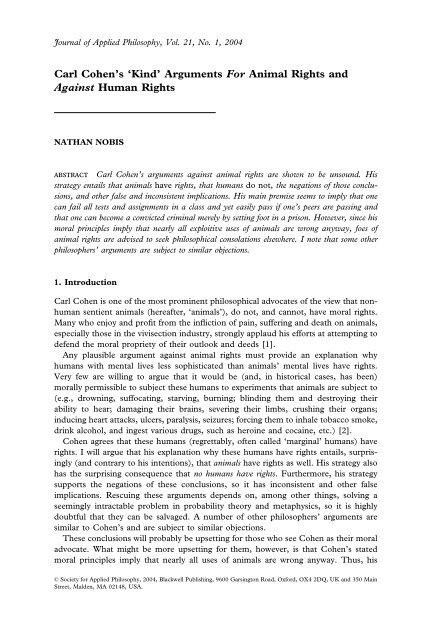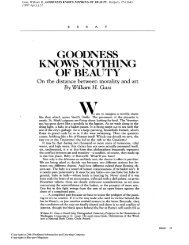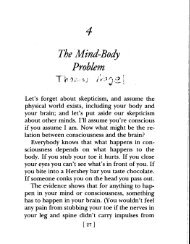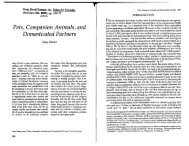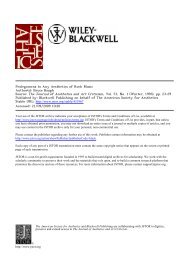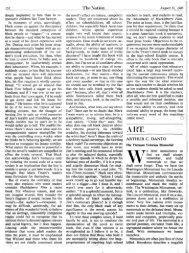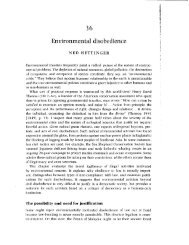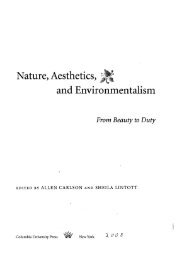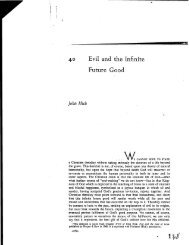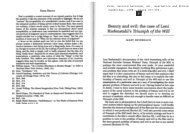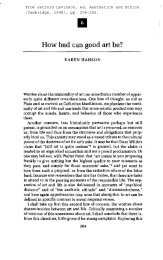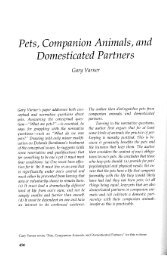Carl Cohen's 'Kind' Arguments For Animal Rights and Against ...
Carl Cohen's 'Kind' Arguments For Animal Rights and Against ...
Carl Cohen's 'Kind' Arguments For Animal Rights and Against ...
You also want an ePaper? Increase the reach of your titles
YUMPU automatically turns print PDFs into web optimized ePapers that Google loves.
Journal of Applied Philosophy, Vol. 21, No. 1, 2004<strong>Carl</strong> Cohen’s ‘Kind’ <strong>Arguments</strong> 43<strong>Carl</strong> Cohen’s ‘Kind’ <strong>Arguments</strong> <strong>For</strong> <strong>Animal</strong> <strong>Rights</strong> <strong>and</strong><strong>Against</strong> Human <strong>Rights</strong>NATHAN NOBISABSTRACT <strong>Carl</strong> Cohen’s arguments against animal rights are shown to be unsound. Hisstrategy entails that animals have rights, that humans do not, the negations of those conclusions,<strong>and</strong> other false <strong>and</strong> inconsistent implications. His main premise seems to imply that onecan fail all tests <strong>and</strong> assignments in a class <strong>and</strong> yet easily pass if one’s peers are passing <strong>and</strong>that one can become a convicted criminal merely by setting foot in a prison. However, since hismoral principles imply that nearly all exploitive uses of animals are wrong anyway, foes ofanimal rights are advised to seek philosophical consolations elsewhere. I note that some otherphilosophers’ arguments are subject to similar objections.1. Introduction<strong>Carl</strong> Cohen is one of the most prominent philosophical advocates of the view that nonhumansentient animals (hereafter, ‘animals’), do not, <strong>and</strong> cannot, have moral rights.Many who enjoy <strong>and</strong> profit from the infliction of pain, suffering <strong>and</strong> death on animals,especially those in the vivisection industry, strongly applaud his efforts at attempting todefend the moral propriety of their outlook <strong>and</strong> deeds [1].Any plausible argument against animal rights must provide an explanation whyhumans with mental lives less sophisticated than animals’ mental lives have rights.Very few are willing to argue that it would be (<strong>and</strong>, in historical cases, has been)morally permissible to subject these humans to experiments that animals are subject to(e.g., drowning, suffocating, starving, burning; blinding them <strong>and</strong> destroying theirability to hear; damaging their brains, severing their limbs, crushing their organs;inducing heart attacks, ulcers, paralysis, seizures; forcing them to inhale tobacco smoke,drink alcohol, <strong>and</strong> ingest various drugs, such as heroine <strong>and</strong> cocaine, etc.) [2].Cohen agrees that these humans (regrettably, often called ‘marginal’ humans) haverights. I will argue that his explanation why these humans have rights entails, surprisingly(<strong>and</strong> contrary to his intentions), that animals have rights as well. His strategy alsohas the surprising consequence that no humans have rights. Furthermore, his strategysupports the negations of these conclusions, so it has inconsistent <strong>and</strong> other falseimplications. Rescuing these arguments depends on, among other things, solving aseemingly intractable problem in probability theory <strong>and</strong> metaphysics, so it is highlydoubtful that they can be salvaged. A number of other philosophers’ arguments aresimilar to Cohen’s <strong>and</strong> are subject to similar objections.These conclusions will probably be upsetting for those who see Cohen as their moraladvocate. What might be more upsetting for them, however, is that Cohen’s statedmoral principles imply that nearly all uses of animals are wrong anyway. Thus, his© Society for Applied Philosophy, 2004, Blackwell Publishing, 9600 Garsington Road, Oxford, OX4 2DQ, UK <strong>and</strong> 350 MainStreet, Malden, MA 02148, USA.
44 Nathan Nobisposition provides, in a certain sense, a moral defence of animals: his views are fundamentallycontrary to the views of those who appeal to him to try to defend theirharmful uses of animals [3].2. Moral <strong>Rights</strong>Some philosophers reject talk of ‘rights,’ but here I will presume that the true moralityincludes moral rights. What does Cohen mean by ‘rights’? This must be understood inorder to evaluate his arguments that humans have rights but animals have none.Cohen briefly explains his concept:A right, properly understood, is a claim, or potential claim, that one partymay exercise against another. The target against whom such a claim may beregistered can be a single person, a group, a community, or (perhaps) allhumankind [4].Here, the question is whether animals have a claim to their most fundamental interests— in not being subject to pain <strong>and</strong> suffering, in retaining bodily <strong>and</strong> mental integrity,<strong>and</strong> in life itself [5], — being respected, even if failing to respect those interests wouldbenefit humans. As Cohen puts it, the question is whether animals have “the right notto be used like inanimate tools to advance human interests . . . no matter how importantwe think those human interests to be” [6].Cohen’s conception of rights is consistent with Tom Regan’s brief explanation ofwhat it is to have rights:To have a right is to be in a position to claim, or to have claimed on one’sbehalf, that something is due or owed, <strong>and</strong> that the claim that is made is aclaim against somebody, to do or forbear what is claimed as due [7].Here what is ‘due’ or ‘owed’ is respectful treatment. Cohen <strong>and</strong> Regan agree thatif animals are due this respect, then all industries <strong>and</strong> practices that exploit animalsfor their instrumental value ought to be abolished, <strong>and</strong> the individuals involved inthis exploitation should be stopped. And this is true, regardless of the possible losses tothe exploiters: they have no right to ill-gotten gains. Thus, the picture of rights is thatof invisible ‘No Trespassing’ signs <strong>and</strong> moral ‘trump’ cards, an exceedingly nonutilitarian<strong>and</strong> non-aggregative moral outlook. <strong>Rights</strong> impose the duty that justice isdone, as the saying goes, ‘though the heavens fall.’These characterizations are rough <strong>and</strong> raise many difficult theoretical questionsabout the nature of rights [8] but are sufficient for our purposes.3. An Underst<strong>and</strong>able Misinterpretation of Cohen’s ArgumentLet us agree that humans have moral rights in the sense that Cohen specifies. Ifhumans have rights <strong>and</strong> animals have none, this must be explained by some differencebetween humans <strong>and</strong> animals. Cohen must hold that there is some necessary conditionfor having rights that humans meet but that all animals fail to satisfy.© Society for Applied Philosophy, 2004
<strong>Carl</strong> Cohen’s ‘Kind’ <strong>Arguments</strong> 45To identify this condition, Cohen seems to makes an important set of observationsabout humans [9]. He notes that only humans are able to conceive of their actions usingmoral concepts; only we are able to believe that we can do right <strong>and</strong> wrong <strong>and</strong> chooseto act in accordance with (or in violation of ) the moral law: only we can freely restrictour own behaviour out of respect for others. These remarks strongly suggest that, onCohen’s view, whether an individual has rights depends on whether that individual hasthese properties, which he calls the ‘capacity for free moral judgment’ [10]. This seemsespecially clear since he claims that, ‘holders of rights must have the capacity to comprehendrules of duty, governing all including themselves . . . [H]olders of rights mustrecognize possible conflicts between what is in their own interest <strong>and</strong> what is just’ [11].Although there is some controversy on these empirical matters, let us agree withCohen that only humans possess the capacity for moral judgment. This forms the basisof a common interpretation of Cohen’s argument that animals have no rights. Itproceeds as follows:(i) If an individual lacks the capacity for free moral judgment, then he or she doesnot have moral rights.(ii) All animals lack the capacity for free moral judgment.(iii) Therefore, animals do not have moral rights.Given Cohen’s words, this is a plausible interpretation. However, a critic will quicklypoint out that premise (i) has a false implication that shows it to be false. Cohen fairlystates the critics’ objection:If having rights requires being able to make moral claims, to grasp <strong>and</strong> applymoral laws, then many humans — the brain-damaged, the comatose, thesenile — who plainly lack those capacities must be without rights. But that isabsurd. This proves (the critic concludes) that rights do not depend on thepresence of moral capacities [12].Cohen agrees that it is ‘absurd,’ or, at least, mistaken, to think that the brain-damaged,the (presumably, non-permanently) comatose, <strong>and</strong> the senile do not have rights. Heagrees that this objection refutes premise (i) above <strong>and</strong> shows this argument to beunsound.4. The ‘Kind’ Interpretation of Cohen’s <strong>Arguments</strong>But Cohen can reply that the above argument is not his argument. He explicitlyannounced that the ‘core’ of his argument against animals’ having rights is this:<strong>Animal</strong>s (that is, nonhuman animals, the ordinary sense of that word) lack thiscapacity for free moral judgment. They are not beings of a kind capable ofexercising or responding to moral claims. <strong>Animal</strong>s therefore have no rights,<strong>and</strong> they can have none [13].The critics’ objection addresses only the first sentence in this quotation, which, if takento suggest a necessary condition for having rights, is mistaken (<strong>and</strong> Cohen agrees). Butthe critics’ objection overlooks the second sentence. Cohen’s argument, therefore, isthis:© Society for Applied Philosophy, 2004
46 Nathan Nobis(1) If an individual is of a kind that lacks the capacity for free moral judgment, then heor she does not have moral rights.(2) Each animal is of a kind that lacks the capacity for free moral judgment.(3) Therefore, animals do not have moral rights.Call this ‘the “kind” argument against animal rights.’ Cohen’s remark suggests aseparate argument for the bolder conclusion that animals not only do not have rights,but that they cannot have rights, but that argument is worth serious attention only ifCohen shows that, as things actually are, animals do not have rights.These arguments are improvements over the Underst<strong>and</strong>able Misinterpretation in that,at least, they do not obviously appear to be subject to objections from cases of ‘marginal’humans. But Cohen’s case against animals can succeed only if he is able to showwhy these humans have rights, despite their lacking the capacity for moral judgment<strong>and</strong> (apparently) failing to meet his stated necessary condition for rights. Cohen thushas another ‘kind’ argument to attempt to circumvent that objection:(1*) If an individual is of a kind that possesses the capacity for free moral judgment,then he or she has moral rights.(2*) Each ‘marginal’ human is of a kind that possesses the capacity for free moraljudgment.(3*) Therefore, ‘marginal’ humans have moral rights.Cohen’s ‘kind’ arguments are not easy to evaluate since Cohen does not explain hispremises. In particular, he does not explain what he means by his use of the term‘kind.’ What ‘kinds’ are <strong>and</strong> what it is to be ‘of a kind’ is not obvious or clear. Since hisarguments depend on ‘marginal’ humans being of a kind that animals are not of (<strong>and</strong>could not be of ) <strong>and</strong> moral principles that appeal to ‘kinds’, it is doubly unfortunatethat he does not explain what he means.Thus, some interpretation is necessary. I will first attempt to underst<strong>and</strong> why thesecond premises of the ‘kind’ arguments, (2) <strong>and</strong> (2*), might be true: why are wesupposed to think that animals are not of a kind that has the capacity for free moraljudgment but that marginal humans are, even though they are unable to make moraljudgments? After some discussion of the problematic nature of these premises (includingan argument that [2*] is necessarily false), I settle on an interpretation that allowsfor them to be true. But I then argue that, given Cohen’s moral principles (1) <strong>and</strong> (1*),this interpretation has implications that are surprising: first, that animals have rights,<strong>and</strong>, second, the false <strong>and</strong> inconsistent implications that humans do <strong>and</strong> do not haverights <strong>and</strong> that even everything does <strong>and</strong> does not have rights. These consequencesshow that Cohen’s strategy is seriously <strong>and</strong> irredeemably flawed.<strong>For</strong> the sake of this first set of arguments I accept Cohen’s moral principles (1) <strong>and</strong>(1*) as true. I later argue, however, that they are false because they are instances of anobviously false general principle.5. An Unkind Objection: ‘Kinds’ Lack Moral PropertiesLet me first present a perhaps unkind objection. Cohen claims that animals are not ofa kind capable of exercising or responding to moral claims <strong>and</strong> that ‘marginal’ humans© Society for Applied Philosophy, 2004
<strong>Carl</strong> Cohen’s ‘Kind’ <strong>Arguments</strong> 47are. To me, these are odd claims because, strictly speaking, kinds are never capableof exercising or responding to moral claims anyway. ‘Kinds’ are abstract objects, classificatorydevices, or metaphysical entities. Individuals are members of kinds in virtueof what properties they have. Perhaps all individuals of a particular kind can respond tomoral claims, but the kind itself does not. To see this, consider this case:Benjamin, Jennifer <strong>and</strong> Joshua encounter a mother in financial distress whodesperately needs money to buy medicine for her sick child: she makes a‘moral claim’ for their financial assistance. They go with her to buy the medicine<strong>and</strong> split the cost three ways.Here the three individuals responded to the moral claim: although though they are ofthat kind ‘beings able to respond to moral claims,’ the kind itself provided no financialassistance. Since there are no kinds capable of responding to moral claims, nothing canbe of such a kind. So premise (2) is true: each animal is of a kind that lacks thecapacity for moral judgment. But it’s true since all kinds lack this capacity. But since allkinds lack this capacity, Cohen’s premise (2*) — that ‘marginal’ humans are of a kindthat possesses the capacity for free moral judgment — is false. Furthermore, thatpremise would seem to be necessarily false since there probably is no possible worldwhere kinds, as abstract objects, have moral capacities. Thus, Cohen’s argument’sdependence on kinds in this way results in it being either unsound or necessarilyunsound: it fails to show that ‘marginal’ humans have rights.But perhaps I’ve been too uncharitable (or dense) in failing to underst<strong>and</strong> what akind is. Let us then overlook this possible refutation. Cohen needs to retain someinterpretation of what it is to be of a kind that might allow him to respond to theobjection from cases of ‘marginal’ humans. I will develop a number of responses <strong>and</strong>show that they all fail for Cohen’s purposes.6. What Kind Are You? What Kind Are <strong>Animal</strong>s?To see why premise (2) might be true, i.e., why animals are not of a kind thatpossesses the capacity for free moral judgment, it might be helpful to see why (2*), theanalogous premise, is supposedly true for ‘marginal’ humans.Let us then consider a case: suppose scientists were, in secret, to perform painful<strong>and</strong> lethal experiments on some orphaned <strong>and</strong> permanently severely mentally challengedhuman infants, experiments which they know will greatly improve the lives ofmany other humans. Cohen is no utilitarian <strong>and</strong> he denies that anyone has a ‘right’ tohis or her life’s being improved at the serious expense of others. So, as far as I can tell,he would judge this experiment as seriously wrong because it would greatly violatethese infants’ rights.Let us agree, but ask why. Again, Cohen says this is so because these humans are ofa kind that possesses the capacity for free moral judgment. That’s just premise (2*).He explains:Persons who are unable, because of some disability [or age], to perform thefull moral functions natural to human beings are certainly not for that reasonejected from the moral community. The issue is one of kind. Humans are of© Society for Applied Philosophy, 2004
48 Nathan Nobissuch a kind that they may be the subjects of experiments only with theirvoluntary consent . . . <strong>Animal</strong>s are of such a kind that it is impossible for them,in principle, to give or withhold voluntary consent or make a moral choice.What humans retain when disabled, animals never had [14].Although interesting, these remarks still do not explain why ‘marginal’ humans are ofsuch a rights-conferring kind <strong>and</strong> animals are not. We are not told what it is about themthat determines their kind-memberships. We must, therefore, speculate on what thesereasons might be.6.1. Kinds Depend on What’s ‘Normal’?First, it might be said that (2*) is true because since ‘normal’ human beings (i.e.,adults) are of the kind ‘possesses moral capacities,’ ‘marginal’ humans are also ofthat kind. Roger Scruton might endorse this suggestion when he writes, “Infants <strong>and</strong>imbeciles belong to the same kind as you or me: the kind whose normal instances arealso moral beings” [15].Here ‘normal’ seems to be understood in a statistical sense: if most human beingshave some characteristic, then it’s normal. But this defence of (2*) succeeds only if thisgeneral principle is true: if ‘normal’ human beings are of some kind K, then ‘marginal’humans are of that kind K as well. But this principle seems clearly false: ‘normal’human beings are of the kinds ‘able to make pasta’, ‘able to reproduce’, <strong>and</strong> ‘able tosolve maths problems <strong>and</strong> drive cars’ but ‘marginal’ humans can do none of these: theyare not of the kind ‘pasta-maker’ or ‘equation solver.’ Most ‘normal’ human beings arealso of the kind ‘over four feet fall’, but most ‘marginal’ humans (i.e., infants) are quiteshort: they are not of that kind.Thus, in general, that fact that it is normal for some humans to be of some kind (orhave some property) does not entail that non-normal humans are also of that kind (orhave that property). So these considerations provide no straightforward reason to thinkthat humans who are statistically abnormal have the capacity for moral judgment or areof that kind [16].6.2. Kinds Depend on What’s ‘Natural’?Similar responses would also be directed to the charge that since it’s ‘natural’ forhumans to have some specific capacities or abilities, ‘marginal’ humans have them aswell <strong>and</strong> so are of the corresponding kind. (Below we will see that Cohen uses the term‘natural’, perhaps to suggest just this).While the meaning of ‘natural’ is often obscure, this principle is refuted by the factthat although it’s ‘natural’ for humans to have two arms <strong>and</strong> IQ scores greater than 90,obviously, there are humans without two arms or with quite low IQ scores. Thesehumans are, of course, of the kind ‘human,’ but they are obviously not of the kinds‘having two arms’ or ‘having average IQ.’ So the fact that some characteristic is‘natural’ does not entail that all humans (including ‘marginal’ humans) have it. Soappeals to what’s ‘natural’ again provide no reason to think that marginal humans areof the kind ‘possess moral capacities.’© Society for Applied Philosophy, 2004
6.3. Kinds Depend on ‘Potentials’ <strong>and</strong> Logical Possibilities?<strong>Carl</strong> Cohen’s ‘Kind’ <strong>Arguments</strong> 49A third suggestion for thinking that ‘marginal’ humans are of a kind that possesses thecapacity for moral judgment is to (apparently) disagree with Cohen <strong>and</strong> argue that‘marginal’ humans do, in fact, possess the capacity for moral judgment <strong>and</strong>, therefore,they are of that ‘kind.’ It might be said that they have this capacity because they arepotential moral agents, or could be moral agents, <strong>and</strong> so are of that kind. This responsehas some initial plausibility, perhaps, since there are unrealized capacities, i.e., abilitiesthat are never exercised: maybe even though ‘marginal’ humans do not make moraljudgments, in some sense they could, so they are of that kind.This response is problematic in many ways: first, given moral principle (1*), itimplies that human fetuses are also of that kind, so all abortions violate their rights,as does any ‘terminal’ experimentation on human cells or tissues that could becomemoral agents. This would include not just fertilized eggs <strong>and</strong> (frozen or fresh) embryos,but any other (human or non-human) cells that could be cultivated into moral agentswere certain technologies (eventually) applied to them. It also might imply that contraception<strong>and</strong> even abstinence violate rights if, like a table-<strong>and</strong>-set-of-chairs canbe considered one thing, an egg-<strong>and</strong>-a-sperm-that-could-fertilize-it is one thing as well,since that sum of those parts has the potential to become a moral agent (as it oftendoes). If this case against animal rights entails that all abortions, contraception, <strong>and</strong>all other activities that prevent potential moral agents from existing violate rights,then at least some of these consequences might rightly be seen as a reductio of thisresponse.Second, this response doesn’t seem to cover all actual ‘marginal’ humans since, forsome who are very seriously damaged or incapacitated, a medical professional mighttruly judge (<strong>and</strong> Cohen would agree) that they even lack the potential to become moralagents since, given their biological condition, that is medically impossible for them:in their lives they will never make moral judgments. One might respond, however,that there is a broader sense of ‘potential’ that applies to these humans. Alan Whitesuggests this response; he says that ‘marginal’ humans “may be for various reasonsempirically unable to fulfil the full role of a rights-holder. But . . . they are logicallypossible subjects of rights to whom the full language of rights can significantly, howeverfalsely, be used” [17]. While advocates of ‘marginal’ humans do not want to agree thatthese rights ascriptions are false, if the suggestion is that since it’s logically possible forthese humans to be moral agents, they are of that kind <strong>and</strong> thereby have rights, thensince it’s also logically possible for animals to be moral agents (i.e., that’s not formallycontradictory), then animals are of that kind <strong>and</strong> have rights as well. So I presume thatthe foe of animal rights does not endorse this defence of (2*).Finally, it’s not at all clear what motivates this response anyway. Although it doesn’tseem to presume the false principle ‘if something potentially or could have property P,then it has property P now’, it’s not clear how it works. Some moral agents are massmurderers: does that mean that all ‘marginal’ humans are potential mass murderers <strong>and</strong>so are of the kind ‘mass murderer’? Some are firefighters: are all humans thereby of thekind ‘firefighter’? Or does this response apply only to ‘normal’ or ‘natural’ characteristic<strong>and</strong> so only these are ones that ‘marginal’ humans have as ‘potentials’? If so, thenthis response seems subject to the objection above. Either way, given this response’s© Society for Applied Philosophy, 2004
50 Nathan Nobisproblematic implications <strong>and</strong> its obscure motivations, it is clear that this appeal topotential is not the way to make a strong case that ‘marginal’ humans have rights <strong>and</strong>animals do not.6.4. Kinds <strong>and</strong> the Grouping ResponseFinally, it might be said that (2*) is true — ‘marginal’ humans are of a kind thatpossesses the capacity for moral judgment — simply because they are human. Manypeople, especially non-philosophers, would think that this is the obvious reason whythey have rights. Cohen, in fact, says this: ‘Human children, like elderly adults haverights because they are human’ [18]. I aim to show that the most plausible defence ofthis claim has disastrous implications for Cohen’s perspective.Recall that the claim isn’t that being human is sufficient for having moral capacities(since Cohen agrees that there are humans who lack these capacities); rather it is thatbeing human is sufficient for being of a kind that possesses the capacity for moraljudgment. But ‘being human’ is multiply ambiguous: on the one h<strong>and</strong>, it might mean‘biologically human,’ ‘being of the species homo sapiens,’ or ‘having human DNA.’ Buton that meaning, human cells <strong>and</strong> tissues are of that kind <strong>and</strong> so have rights. Cohendoesn’t appear to think this, so I presume that when he says that ‘marginals’ arehuman, he means something like that they are human organisms who are living, intact,<strong>and</strong> have achieved sufficient development to be sometimes conscious. This descriptionis imperfect, but the question still remains: how is it that all beings like that are of akind that possesses the capacity for moral judgment?Cohen never asks or answers a question like this, but I suspect his complete answerwould be something like this:To have rights, something (or someone) must be of a kind that possessesmoral capacities: being of a kind that possesses moral agency is necessary forhaving rights. ‘Marginal’ humans are of a kind that possesses moral capacitiesbecause they are human. Being human makes them a member of the kind thatpossesses moral capacities. This is because all moral agents are of that kind: allmoral agents are human. Since moral agents <strong>and</strong> ‘marginal’ humans are both ofthe kind ‘human’ [19] — they share a property — ‘marginals’ are also of a kindthat possesses moral capacities as well. Therefore, they have moral rights.If this is Cohen’s strategy (<strong>and</strong> it seems that this, or something very much like it,is), then the animal rights advocate can play that game to ‘demonstrate’ that, paceCohen, animals are also of the kind that has moral capacities <strong>and</strong>, therefore, haverights.Why are animals of such a rights-generating kind? <strong>For</strong> Cohen-esque reasons exactlyparallel to those given in defence of ‘marginal’ humans. The reasoning will run likethis: first, most humans are moral agents <strong>and</strong> so, on Cohen’s view, have rights; second,there is a kind that both moral agents <strong>and</strong> animals are members of, e.g. the kind‘sentient being,’ ‘conscious being,’ ‘subject of a life’, or ‘being with preferences’ (infact, there are many kinds that animals <strong>and</strong> humans share membership in); <strong>and</strong> third;since animals <strong>and</strong> moral agents are both of a kind, e.g. the kind ‘sentient being’ — i.e.they share a property — animals are also of a kind that possesses moral capacities <strong>and</strong>,therefore, they have rights.© Society for Applied Philosophy, 2004
<strong>Carl</strong> Cohen’s ‘Kind’ <strong>Arguments</strong> 51This method of reasoning can also be used to ‘demonstrate’ falsely that, fromCohen’s perspective, humans have no rights. Consider all the various objects on earth:most of them are of the kind ‘lacking moral capacities’ <strong>and</strong> so, on Cohen’s view, theydon’t have rights. But humans are of a kind with these various objects, e.g. the kind‘thing on earth’ or ‘earthly specimen’ or an ‘object quite far from the sun.’ Since mostmembers of these kinds lack the capacity for free moral judgments <strong>and</strong> humans aremembers of these kinds, this fact <strong>and</strong> Cohen’s premise (1) — if an individual is of akind that lacks the capacity for free moral judgment then it does not have moral rights— imply that humans do not have rights. But, perhaps I’ve got it backwards: since allthese non-conscious material objects are of a kind with normal humans since theyshare properties with these humans, they all have rights too. Since all these inconsistentconclusions (<strong>and</strong> more) are warranted on Cohen-esque reasoning, these are devastatingimplications.Cohen might object <strong>and</strong> claim that not just any old shared property will do the trickto get an individual into a kind that possesses moral capacities. He might claim thatthe only relevant shared property, or common kind, is biological: only that can providethe proper, rights-conferring relation to moral agents [20]. But he provides no reasonwhy this is so. He can pick biological or genetic kinds to try to suit his purposes, butthe defender of animal rights can grant Cohen’s strategy <strong>and</strong> just pick other relations<strong>and</strong> shared properties to justify her contrary conclusions. Different kinds of propertiesare equally shared between animals, ‘marginal’ humans <strong>and</strong> moral agents. And, aswe’ve seen, Cohen’s strategy can be adopted to support any conclusion <strong>and</strong> its negation.Cohen provides no reason to side with any perspective on this issue: they are allequally plausible on his account <strong>and</strong>, thus his account is highly implausible.Making the issue ‘one of kind’ is highly problematic since humans <strong>and</strong> animalsare all members of infinitely many kinds or classes: we are all ‘tokens’ of many ‘types.’It is very difficult (if not impossible) to identify what kind one is in a non-arbitrarymanner since no one group or kind can reasonably be said to be ‘the’ group or kindthat someone is a member of. Most who work in probability theory <strong>and</strong> metaphsicsconcede that this problem, sometimes called the ‘reference problem,’ is a highlyintractable. Cohen does not explain how one picks what kind of thing something isor which kind, of the many kinds any one thing is, best suits that thing. On the oneh<strong>and</strong>, he claims that being of the kind ‘possesses moral capacities’ is necessary forhaving rights, but on the other h<strong>and</strong> he claims that being of the kind ‘human’ issufficient for being of a kind that possesses moral capacities. Any attempt to get fromthe former to the latter kind is going to require an arbitrary <strong>and</strong> indefensible pick ofthe kind.In sum, to return to the ‘kind’ arguments, if we grant that (2) <strong>and</strong> (2*) are true, onwhat I have suggested is the best explanation for why they are true, animals are alsoof a kind that possess the capacity for moral judgments <strong>and</strong> humans are of kinds thatlack it. This is because animals are members of groups where some (or most) of themembers have moral capacities <strong>and</strong> humans (‘marginal’ or not) are members ofgroups where none (or few) of the members have moral capacities. Given Cohen’smoral principles (1) <strong>and</strong> (1*), this implies that animals <strong>and</strong> humans both have <strong>and</strong>don’t have rights, as well as other obviously false <strong>and</strong> inconsistent conclusions. Cohen’sarguments are clearly deeply flawed. Perhaps there is another way to interpret them,but nothing suggests itself in Cohen’s writings.© Society for Applied Philosophy, 2004
52 Nathan Nobis8. Partners in ‘Kind’Cohen’s ‘getting-rights-by-association-in-a-kind’ strategy is not unique. As mentionedabove, Scruton seems to invoke it. Michael Allen Fox suggested it: he claimed that that“human beings have basic moral rights because they are beings of the requisite kind,that is, autonomous beings, persons, or moral agents.” In response to the objectionthat some humans aren’t autonomous moral agents, he claimed that “membership inour own species ought to count for something” [21]. But explaining how humanbiology might, in itself, ‘count’ for being of the kind ‘moral agent’ is obviously difficult.And it’s not clear why our memberships in the kinds ‘sentient-being’ or ‘subject-of-alife’aren’t more obviously rights-relevant anyway. Fox agrees; he later rejected hisoriginal position against animals calling it arrogant, complacent <strong>and</strong> arbitrary.David Schmidtz suggests that a speciesist could respond to objections from ‘marginal’cases in this way:Of course, some chimpanzees lack the characteristic features in virtue of whichchimpanzees comm<strong>and</strong> respect as a species, just as some humans lack thecharacteristic features in virtue of which humans comm<strong>and</strong> respect as aspecies. It is equally obvious that some chimpanzees have cognitive capacities(for example) that are superior to the cognitive capacities of some humans.But whether every human being is superior to every chimpanzee is beside thepoint. The point is that we can, we do, <strong>and</strong> we should make decisions on thebasis of our recognition that mice, chimpanzees, <strong>and</strong> humans are relevantlydifferent types. We can have it both ways after all [22].While mice, chimpanzees, <strong>and</strong> humans are of different types, they are also of somesame types since they share many properties. The problem for this speciesist would bespecifying, in a plausible <strong>and</strong> defensible manner, why being of the type ‘biologicallyhuman’ is, in itself, a morally relevant type. It appears not to be, since human biologyseems neither necessary nor sufficient for having rights: friendly space aliens couldhave rights <strong>and</strong> dead, human cells in a Petri dish do not. This speciesist would alsoneed to explain why a psychological type such as sentience or being-the-subject-of-alifeis not relevant (or is not as relevant). She cannot have it both ways: either she hasa theory of rights that appeals to plausible, psychological types as the basis for rights(which overlap between species), or she appeals to types that are not in themselvesmorally relevant, like DNA possession.Leslie Pickering Francis <strong>and</strong> Richard Norman might provide some help: they suggestthat “what are important are the relations in which human beings st<strong>and</strong> to one another”[23]. They base these relations on shared biological properties, but no reason isgiven why shared psychological properties are not the basis of an equally, or at leastvery, important relation. Finally, Robert Wennberg suggests that, “a fundamental differencein kind [between humans <strong>and</strong> animals] can be found in the religious capacitypossessed by humans” [24]. True, some humans have these capacities, but not all.And if ‘marginal’ humans’ rights depends on these capacities, any attempts to securethem by a relation are probably subject to Cohen-esque objections all over again.So, Cohen is not alone in his kind arguments, but other philosophers’ attempts areas unsuccessful as his are. ‘Kind’ strategies are often suggested, but never carefullydeveloped or defended.© Society for Applied Philosophy, 2004
<strong>Carl</strong> Cohen’s ‘Kind’ <strong>Arguments</strong> 539. Cohen’s False Moral PrinciplesUntil now, my focus has been on premises (2) <strong>and</strong> (2*). I will now argue that Cohen’smoral principles (1) <strong>and</strong> (1*) are instances of a false principle, although one we mightsometimes (<strong>and</strong> sometimes not) wish were true. I will call it the ‘Getting a Property byAssociation Principle.’ Much of my discussion has already alluded to it: it is a moregeneral formulation of the motivating idea behind Cohen’s moral principles:If (1) an individual A is a member of some kind K <strong>and</strong> (2) some, most or allof the other members of that kind K have some property C <strong>and</strong> (3), on thebasis of having property C, they have property R, then individual A hasproperty R as well, even though A lacks property C.Something like this principle seems to be the driving force behind Cohen’s response tothe argument from marginal cases: even though each marginal human (A) lacks moralcapacities (C), since each is a member of a group or kind (K) where the other memberspossesses moral capacities (C) <strong>and</strong> so have rights (R) because of their moralcapacities (C), marginal humans have rights (R), roughly, by association.Consider a case where you’d wish this principle were true: you are a student (A) ina class who has failed the exams <strong>and</strong> done none of the homework so, on your ownmerits, you are failing. However, fortunately for you, the rest of the students have theproperties of ‘passing the exams <strong>and</strong> done well on the homework’ (C) <strong>and</strong>, on thatbasis, have the property (R), passing the course.’ If Cohen’s principle were true, youtoo would have the property of passing the class as well because you are a member ofthe kind (K) ‘students taking this class’ <strong>and</strong> the properties from the majority transfer toyou. Unfortunately for you, this property you would possess only on your own merits(which you lack since you have failed the exams <strong>and</strong> have done none of the work), soCohen’s principle is false.A case were you’d be glad that this principle were false would be one where you (A)visit a friend who has been convicted of a heinous crime (C) <strong>and</strong>, on that basis, is nowserving a life sentence in prison (R). Let’s suppose that most people in this prison havethese two properties. However, upon entering the prison as a visitor you become amember of the kind (K) ‘a person who is physically located in the prison’ <strong>and</strong> you arepart of this kind or group along with the prisoners. However, fortunately for you, eventhough you are now of that kind, their properties of (C) ‘being convicted of a heinouscrime’ <strong>and</strong> (R) ‘now serving a life sentence’ do not transfer to you. Now you are gladthat Cohen’s principle is false <strong>and</strong> that you can’t get these properties by association.Since Cohen’s moral premises (1) <strong>and</strong> (1*) reply on the false ‘Getting a Property byAssociation Principle,’ this is yet another reason to reject Cohen’s arguments.10. Cohen’s Other <strong>Arguments</strong>Cohen offers suggestions for other arguments against animal rights. Most are notideally clear <strong>and</strong> are underdeveloped, but they deserve comment. He claims that,<strong>Rights</strong> arise, <strong>and</strong> can be intelligibly defended, only among beings who actuallydo, or can, make moral claims against one another. Whatever else rights may© Society for Applied Philosophy, 2004
54 Nathan Nobisbe, therefore, they are necessarily human; their possessors are persons, humanbeings [25].To reply roughly in reverse order of the quote; first, from the fact that human personspossess rights it does not follow that animals do not; second, since rights themselvesclearly are not human, they are not ‘necessarily human.’ Perhaps Cohen means to pointout the obvious truth that the concept of rights is a concept that, as far as we know, onlyhumans have. Maybe he wanted to make the bold suggestion that, necessarily, onlyhumans have that concept. But even if those claims were true, that does not show thatanimals don’t have rights: animals not having the concept of p does not entail that theylack the property of p. <strong>Animal</strong>s lack the concept of ‘being an animal’, but they still areanimals: like us they have many properties for which they lack related concepts.To continue, third; the only beings who will ‘intelligibly defend’ rights will be beingswho are intellectually sophisticated enough to grasp the concept of rights: they willlikely have rights themselves, but this implies nothing for beings who cannot defendtheir rights; fourth, animal advocates agree with Cohen that animals have rights onlyagainst moral agents: were there no moral agents then no one, including animals,would have rights; <strong>and</strong>, fifth, again while the concept of rights was developed by, or‘arose’ among, intelligent moral agents, this does not show that animals don’t have theproperty of having rights: the concept of ‘DNA’ arose among moral agents, but animalshave a genetic code. Thus, nothing here gives any plausible reason to think animals donot or cannot have rights.Cohen also claims that,<strong>Animal</strong>s cannot be the bearers of rights because the concept of rights isessentially human; it is rooted in, <strong>and</strong> has force within, a human moral world[26].There is much unclear about these claims. What it is for a concept to be ‘essentiallyhuman’ is not said. But if the concept of rights is ‘essentially human’ <strong>and</strong> so animalstherefore cannot have the property of having rights, then since the concept of humanetreatment seems to be as ‘essentially human’ as the concept of rights is, it would seemthat Cohen should think animals cannot have the property of being such that we’reobligated to treat them humanely either [27]. Since Cohen does think that animalsshould be treated humanely [28], he can’t think that animals need to have that conceptin order for us to be obligated to treat them that way. So, on Cohen’s own view, thefact that animals lack the concept of rights is irrelevant to whether they might haverights. If the suggestion is that something can have a property only if it (or things of itskind, to muddy the waters) possesses the correlated concept, this is clearly false sincewe all have properties for which we lack the related concepts [29]. Again, the fact thatthe concept of rights applies to humans <strong>and</strong> is ‘rooted in’ <strong>and</strong> has ‘force within’ humancommunities again does not imply that animals do not or cannot have rights.Cohen also suggests that having rights is an ‘essential’ property of humans: thiswould correspond to his ‘kind’ conclusion that it’s impossible for animals to have rights[30]. On a common view, if an individual has a property ‘essentially’ then is it metaphysicallyimpossible for that individual to exist without that property. Since Cohen’ssuggestion raises too many deep metaphysical questions, which he has not yetaddressed, I will not speculate on what the arguments that might be developed from© Society for Applied Philosophy, 2004
<strong>Carl</strong> Cohen’s ‘Kind’ <strong>Arguments</strong> 55this suggestion would look like. However, even if it were true that humans (or allrights-bearers in the actual world) essentially, or necessarily, have rights (which seemsto be false, given the logical possibility of a Planet of the Apes-like scenario wherehumans have the mental sophistication of apes <strong>and</strong> so, on Cohen’s view, do not <strong>and</strong>cannot have rights), that wouldn’t imply that animals can’t have rights either.11. Is Cohen’s Position an <strong>Animal</strong> <strong>Rights</strong> Position?While others have shown that Cohen’s arguments are defective, I hope that I haveshown that they are even worse than anyone suspected since, for one thing, anyargument against animal rights that can be converted to an argument for animal rights<strong>and</strong> against human rights (<strong>and</strong> other false <strong>and</strong> inconsistent conclusions) is a greatblunder. While critics often claim that animal advocates care more about animals thanhumans, <strong>and</strong> are sometimes even called ‘human haters’, if Cohen-esque argumentsimply that humans don’t have rights, these critics have missed their true target.To defend his arguments, Cohen will have to solve the ‘kind’ problem I haveidentified above: for deep reasons beyond moral philosophy, this is likely to be verydifficult, if not impossible. To respond to the objection from ‘marginal’ humans, hewill have to adequately explain what properties humans possess that makes themhave rights. It isn’t the relation that he suggests, since, if it is, there are other relationsthat defeat his position <strong>and</strong> his strategy results in stalemate. He will have to explainwhy the presumption, which he rejects, that ‘rights are tied to some identifiableindividual abilities or sensibilities’ [31] is mistaken even though the denial of thisclaim led first a vicious regress (since if an individual’s rights aren’t tied to her abilities<strong>and</strong> sensibilities, but are tied to another individual’s, but hers are tied to someoneelse’s, whose are tied to someone else’s, ad infinitum, then there is no basis for rights);<strong>and</strong> led, secondly, to epistemological skepticism about rights (if they’re not tied toidentifiable abilities, are they tied to unidentifiable abilities? If so, we can’t identifythem).Of course, to refute Cohen’s arguments is not to show that the conclusions headvocates — that animals do not <strong>and</strong> cannot have rights — are not true: it is only toshow that Cohen has provided no rational support for them whatsoever. Anyone whoaccepts Cohen’s conclusions can concede his defeat: to rationally retain his or herview, however, she need only then base her belief that animals do not have rights onstronger reasons than those Cohen offers. If she has these reasons, then she should notbe troubled; if not, she needs to develop them or find someone who can, if she wishesto rationally maintain her view. Thus, the animal exploitation industries <strong>and</strong> communityneed to find a new philosophical defender of the moral propriety of theirpractices. The likelihood that their search will be successful is very low [32].Were Cohen’s arguments salvageable, however, that would not really help animalexploiters defend themselves. After all, Cohen also claims that “We have a universalobligation to act humanely, <strong>and</strong> this means that we must refrain from imposing painon sentient creatures so far as we reasonably can,” <strong>and</strong> he states that animals “oughtnot be made to suffer needlessly” (whether he would allow for animals to have a rightnot to be made to suffer needlessly is unclear) [33]. But all, or nearly all, uses ofanimals for food, fashion, education, entertainment <strong>and</strong> product ‘testing’ cause pain© Society for Applied Philosophy, 2004
56 Nathan Nobis<strong>and</strong> suffering that we can reasonably refrain from imposing since we don’t need any ofthe products from this exploitation in order to have meaningful <strong>and</strong> healthy lives. Sothese uses of animals are morally condemnable on Cohen’s view [34]. Cohen alsoexpresses ‘repugnance for the hunting of animals for mere amusement’ [35], but,ultimately, nearly all other uses of animals come to mere amusement as well sincethey’re only for the merely aesthetic pleasures of experiencing certain tastes, wearingcertain clothing, being entertained in certain ways <strong>and</strong> using certain cosmetics <strong>and</strong>personal <strong>and</strong> household products (all of which can be experienced in cruelty-freemanners or easily gone without). Thus, given what follows from the empirical facts <strong>and</strong>Cohen’s own moral principles, his views are, in a certain sense <strong>and</strong> concerning theissues that affect most animals, those of an animal rights advocate after all.As for vivisection, neither Cohen nor anyone else has shown that it is ‘necessary’for medical progress: nobody has shown that some specified amount of vivisectionis (probably) indispensable for bringing about the greatest possible overall medicalbenefits. Nobody has argued that, despite all the other research methods available(<strong>and</strong>, more generally, methods of improving people’s health, most of which are justthe implementation <strong>and</strong> distribution of existing medical knowledge anyway, not newresearch), no other possible use of funds, time <strong>and</strong> talent could (or likely would) bringabout a greater improvement in health for humans than animal research [36].Few advocates of vivisection accept utilitarianism, but they often they appeal to itto try to justify their actions [37]. But, again, no one has done anything close to theconceptual <strong>and</strong> empirical work that would be needed to make a serious attempt asjustify any animal research on utilitarian grounds: no advocate of vivisection has providedany method for calculating <strong>and</strong> comparing (actual) animal harms to (merelypossible) human benefits, calculated direct human harms that are consequence ofvivisection, calculated indirect harms <strong>and</strong> opportunity costs that result from fundsbeing directed towards vivisection <strong>and</strong> not towards producing other benefits (<strong>and</strong>utilitarianism has no bias for medical benefits), <strong>and</strong> somehow added it all up toconclude reasonably that the calculation favours using animals. Even if some benefitswere lost were some or all vivisection stopped, that would not be enough to justify it onutilitarian grounds, since one has to show that there is no alternative course of actionthat would yield greater benefits. Perhaps this case can be made, but nobody has tried.Until this is done, the most reasonable attitude might be a skeptical one.12. What Kind We AreIn conclusion, it is sometimes said that we should first look after or take care of ‘ourown kind.’ It used to be thought that ‘our kind’ was our race, or sex, or ethnic group,or social class. Outsiders were judged ‘not of our kind’ <strong>and</strong> that justified inconsiderate,often exploitive, treatment. <strong>For</strong>tunately, those responses are now seen as the unjustifiedprejudices they were. But we are of many kinds <strong>and</strong> the pressing challenge is toidentify the morally relevant ones. Since it seems that ‘marginal’ humans have rights,moral agency is not necessary for rights: to think we are responsible only to othermoral agents — that they are our unique kind <strong>and</strong> due preferential treatment — wouldbe another unjustifiable prejudice. But since being of the kind ‘biologically human’ isneither logically sufficient nor conceptually necessary for having rights, biological kinds© Society for Applied Philosophy, 2004
<strong>Carl</strong> Cohen’s ‘Kind’ <strong>Arguments</strong> 57are not in themselves morally relevant either. Furthermore, we share little, morally,with human cells in flasks or organs in an icepack: bare biology doesn’t count formuch. Insofar as Cohen’s case appeals to both those kinds, it is flawed.So, if Cohen is mistaken, what kind is morally relevant? If it were true that weshould take care of our own kind, what kind would that be? The simplest answer, withthe most explanatory power, is that the boundary of our kind is not marked by speciesor moral agency. What kind are we? We are conscious, sentient beings, <strong>and</strong> manyhuman <strong>and</strong> non-human animals are like us in that. Being of that kind is what’sfundamentally morally relevant, vast practical consequences follow from this, <strong>and</strong> Cohenprovides no reason to think otherwise [38].Nathan Nobis, Philosophy Department, University of Rochester, Rochester, NY 14627-0078,USA. nobs@mail.rochester.eduNOTES[1] DAVID DEGRAZIA reports that Cohen’s arguments against animal rights <strong>and</strong> in favour of speciesism,not giving animals’ interests even serious (not necessarily equal) consideration <strong>and</strong> the human utility ofvivisection have been ‘much praised by the medical community but severely criticized by philosophers.’D. DEGRAZIA (1996) Taking <strong>Animal</strong>s Seriously: Mental Life <strong>and</strong> Moral Status (Cambridge, CambridgeUniversity Press), p. 36, footnote 2. He references some articles that contain such praise <strong>and</strong> commentsthat “It is a sad statement about prevailing levels of intellectual integrity that uncomprehending,automatic dismissal of the possibility of equal consideration [of animals’ interests] is deemedworthy of publication in many medical journals” (p. 49, footnote 21). Casual perusal of the World WideWeb reveals animal agribusiness, hunters, <strong>and</strong> trappers expressing praise for Cohen’s argumentsas well.[2] <strong>For</strong> a contrary view, see R. G. FREY, (2001) Justifying animal experimentation: the starting point inE. F. PAUL <strong>and</strong> J. PAUL (eds.) Why <strong>Animal</strong> Experimentation Matters: The Use of <strong>Animal</strong>s in Medical Research(London, Transaction Publishers), pp. 197–214. This list of experimental procedures is from T. REGAN(2002) Empty cages: animal rights <strong>and</strong> vivisection, in RYDER, R., MATFIELD, M., DERBYSHIRE, D. <strong>and</strong>REGAN, T. <strong>Animal</strong> Experimentation: Good or Bad? (London, Hodder & Stoughton Educational). MichaelAllan Fox provides a similar catalogue of procedures, noting that anaesthesia is often not used, in M. A.FOX (1986) The Case for <strong>Animal</strong> Experimentation: An Evolutionary <strong>and</strong> Ethical Perspectives (Berkeley,University of California Press), p. 97.[3] <strong>For</strong> clarity, animal advocates have no quarrel with research that does not harm animals at all (e.g.observational studies in the wild), research with non-conscious, non-sentient animals, <strong>and</strong> therapeuticresearch where the individual animal subjects also benefit (or will probably benefit) from the research.It, of course, is inadequate to claim that since ‘the species’ benefits, some vivisection is justified: ‘thespecies’ of humans, i.e. some humans, might benefit from human vivisection, but that presumablywouldn’t justify it. <strong>For</strong> discussion, see D. DEGRAZIA (1999) The ethics of animal research: what are theprospects for agreement? Cambridge Quarterly of Healthcare Ethics 8, pp. 23–34.[4] C. COHEN (1986). The case for the use of animals in biomedical research, The New Engl<strong>and</strong> Journal ofMedicine, 315, 14, October 2, pp. 865–870, p. 865.[5] Since being alive is a necessary condition for the satisfaction of interests, animals who have interestshave, at least derivatively, an interest in their lives continuing.[6] COHEN (2001), p. 22, in C. COHEN <strong>and</strong> T. REGAN (2001) The <strong>Animal</strong> <strong>Rights</strong> Debate (Lanham, MD,Rowman <strong>and</strong> Littlefield).[7] T. REGAN, pp. 19–20, footnote 1, in COHEN, C. <strong>and</strong> REGAN, T. (2001) op. cit. Emphasis mine.[8] <strong>For</strong> example, one theoretical concern is what rights views (for animals <strong>and</strong> humans) imply for casesof conflict, e.g. ‘lifeboat’ cases. These puzzles are philosophically challenging, but, they no more need tobe solved to answer many current practical questions concerning animals than they need to be solvedto address analogous questions concerning humans: e.g. despite controversies <strong>and</strong> unsatisfactorilyanswered questions about rights (<strong>and</strong> ethical theory in general), few are skeptical about (or practically© Society for Applied Philosophy, 2004
58 Nathan Nobisparalyzed by the question of ) whether humans (‘marginal’ or not) should be vivisected or not. <strong>For</strong>discussion of lifeboat problems, see A. TAYLOR (2003) Ethics <strong>and</strong> <strong>Animal</strong>s (Calgary, Broadview Press),pp. 134–135.[9] COHEN, C. (1986) op. cit., p. 866; C. COHEN (1997) Do animals have rights? Ethics & Behavior, 7, 2,91–102, pp. 94–98; COHEN, C. (2001) op. cit., pp. 30–40. Cohen’s arguments are quite similar in all hiswritings: more recent discussions are not more developed.[10] Although Cohen’s discussion strongly suggests that possession of rights depends on moral agency, it isnot completely clear that he thinks this, since he says that he will not even attempt to explain thefoundations of rights: see COHEN, C. (2001) op. cit. DeGrazia reports that Cohen ‘never really arguesthat humans have rights, instead [he relies on] appealing to the authority of philosophical tradition’ tosupport his claim that humans have rights. D. DEGRAZIA (2003) Review of Cohen, <strong>Carl</strong> <strong>and</strong> Regan,Tom. The <strong>Animal</strong> <strong>Rights</strong> Debate, Ethics 113, 3, pp. 692–695, p. 692. Regan argues that Cohen “fails tooffer any explanation [of ] what makes claims to rights valid . . . Why we should accept his assertion thatrights are valid claims, <strong>and</strong> what he means when he says that they are, thus are <strong>and</strong>, in his h<strong>and</strong>s, mustremain matters of pure conjecture, lacking anything by way of requisite explanation let alone thoughtfuljustification,” Regan in COHEN <strong>and</strong> REGAN (2001) op. cit., p. 273.[11] COHEN (1986) op. cit., p. 866, emphasis mine.[12] COHEN (1986) op. cit., p. 866. This response is also in COHEN (2001) op. cit., pp. 36–37 in COHEN <strong>and</strong>REGAN (2001) op. cit.[13] COHEN (1986) op. cit., p. 866. This response is also in COHEN, C. (2001), pp. 36–37, in COHEN <strong>and</strong>REGAN (2001) op. cit.[14] COHEN, C. (1986) op. cit., p. 866. Emphasis mine.[15] Scruton continues, “It is this that causes us to extend to them the shield that we consciously extend toeach other <strong>and</strong> which is built collectively through our moral dialogue.” Note the conflation between whatmight cause us to believe that such ‘marginal’ humans have such rights <strong>and</strong> the moral justification forsuch rights. R. SCRUTON (2000) <strong>Animal</strong> <strong>Rights</strong> <strong>and</strong> Wrongs (London, Demos), p. 55.[16] James Rachels interprets Cohen’s claim that ‘the issue is one of kind’ as the claim that what’s morallyrelevant is what’s statistically normal for most individuals of a species. He then argues that this approachis mistaken since it falsely implies that a statistically abnormal intelligent, thoughtful chimp who couldengage us in conversation couldn’t have rights. J. RACHELS (1990) Created from <strong>Animal</strong>s: The MoralImplications of Darwinism (Oxford, Oxford University Press), pp. 186–187.[17] A. WHITE (1984) <strong>Rights</strong> (Oxford, Oxford University Press). The quotation is reprinted in T. REGAN <strong>and</strong>P. SINGER (1989) <strong>Animal</strong> <strong>Rights</strong> <strong>and</strong> Human Obligations (Englewood Cliffs, NJ, Prentice Hall), pp. 119–121, p. 120. Emphasis mine.[18] COHEN (2001) op. cit., p. 37.[19] Although he does not quite say so, presumably the kind that Cohen has in mind is the biological kindhomo sapiens, since he does advocate ‘speciesism.’ See C. COHEN (2001) The moral inequality of species:why ‘speciesism’ is right, pp. 59–68 in COHEN, C. <strong>and</strong> REGAN, T. (2001) op. cit. I should note thatCohen misunderst<strong>and</strong>s what is typically meant by ‘speciesism.’ He mistakenly thinks that if one rejectsspeciesism then one will treat all animals exactly the same, irrespective of their different needs <strong>and</strong>dispositions. But those who reject speciesism reject the view that for comparable harms to a human <strong>and</strong>a non-human, the harms to a human are, considered in themselves, necessarily morally worse. But of coursethey think animals should be treated according to their different interests.[20] James Rachels objects to Cohen’s denying ‘moral individualism,’ the thesis that how an individual shouldbe treated depends on his or her own characteristics, not others’ characteristics or what groups thatindividual is a member. This objection isn’t quite successful since one’s own characteristics include one’srelations to others <strong>and</strong> group or kind memberships. Rachels surely thinks that the fact that ‘marginal’humans <strong>and</strong> animals are members of the ‘group’ or ‘kind’ sentient being is morally relevant (although wewould typically just say that it’s because they are sentient, rather than the wordier, but equivalent, claimthat they are of that group or kind). So there is nothing necessarily problematic in appealing to kinds orgroups: the problem is appealing to morally irrelevant ones <strong>and</strong> failing to defend one’s views. SeeRACHELS, J. (1990) op. cit., pp. 173–174, 187.[21] FOX (1986) op. cit., pp. 56, 60, emphases mine; M. A. FOX (1987) <strong>Animal</strong> experimentation: a philosopher’schanging views’ Between the Species 3, 55–60, 75, 80, 82.[22] D. SCHMIDTZ (1998) Are all species equal? Journal of Applied Philosophy 15, 1, pp. 57–76, p. 61.Emphasis mine.© Society for Applied Philosophy, 2004
<strong>Carl</strong> Cohen’s ‘Kind’ <strong>Arguments</strong> 59[23] L. P. FRANCIS <strong>and</strong> R. NORMAN (1978) Some animals are more equal than others Philosophy 53,pp. 507–527, p. 518.[24] R. WENNBERG (2003) God, Humans <strong>and</strong> <strong>Animal</strong>s: An Invitation to Enlarge our Moral Universe (Gr<strong>and</strong>Rapids, Eerdmans Publishing), p. 120. He argues that animals’ interests should be given very seriousconsideration, but retains a higher moral status for humans. Surprisingly, however, he seems to arguealso that obligations to ‘marginal’ humans are only indirect <strong>and</strong> pragmatically justified, pp. 221–222.[25] COHEN (1986) op. cit., p. 865.[26] COHEN (1997) op. cit., p. 95.[27] Regan argues similarly. REGAN (2001) op. cit., in C. COHEN <strong>and</strong> T. REGAIN, op. cit., pp. 274–275.[28] COHEN, p. 29 in COHEN <strong>and</strong> REGAN, op. cit. Cohen advocates the humane treatment of animals <strong>and</strong> seesthis obligation as a direct duty to animals because they are sentient.[29] Regan argues similarly. Regan, pp. 283–284 in Cohen <strong>and</strong> Regan, op. cit.[30] COHEN (2001), p. 37 in Cohen <strong>and</strong> Regan op. cit. COHEN (1986) op. cit., p. 866.[31] COHEN (1997) op. cit., p. 97. Emphases mine.[32] Peter Carruthers argues on contractualist grounds that animals lack moral status <strong>and</strong> so most uses ofthem are morally permissible (he has also agued that animals do not feel pain in any morally significantsense, but seems to reject that position now). See P. CARRUTHERS (1992) The <strong>Animal</strong>s Issue (New York,Cambridge University Press). <strong>For</strong> effective criticism, see S. WILSON (2001) Carruthers <strong>and</strong> the argumentfrom marginal cases, Journal of Applied Philosophy, 18, 2, pp. 135–147 <strong>and</strong> Wennberg op. cit., pp. 132–137. Tibor Machan claims, for Cohen-esque reasons, that humans’ use of animals is permissible becausedoing so makes ‘the best use of nature for our success in living our lives.’ T. MACHAN (2002) Whyhuman beings may use animals, Journal of Value Inquiry, 36, 1, pp. 9–14, p. 11. He notes that we alsomight benefit from using (marginal) humans, but does not explain why that would be wrong. He merelystates that “as far as infants or the significantly impaired among human beings are concerned, theycannot be the basis for a general account of human morality, of what rights human beings have.Borderline cases matter in making difficult decisions but not in forging a general theory.” That might betrue, but these remarks provide no reason to think that marginal humans have rights <strong>and</strong> animals don’t,so Machan’s views remain incomplete <strong>and</strong> undefended. Some vivisectors <strong>and</strong> philosophers attempt toargue that it is permissible or obligatory to use animals in E. F. PAUL <strong>and</strong> J. PAUL (eds.), op. cit. (see Note[2] above), but their attempts fail. See N. NOBIS. So why does animal experimentation matter? review ofEllen Franken Paul <strong>and</strong> Jeffrey Paul (eds.) Why <strong>Animal</strong> Experimentation Matters: The Use of <strong>Animal</strong>s inMedical Research, American Journal of Bioethics 3, 1 (available only online at www.bioethics.net).[33] COHEN, pp. 5, 59, 60 in COHEN <strong>and</strong> REGAN op. cit. COHEN (1986) op. cit., p. 867.[34] <strong>For</strong> a similar style of argument, see M. ENGEL (2001) The mere considerability of animals, ActaAnalytica, 16, pp. 89–108. Engel argues that the Lawrence Becker, Bonnie Steinbock, <strong>and</strong> Peter Caruthers’smoral premises that require myn-consideration (minimal-yet-non-negligible) entail the same practicalconclusions regarding the morality of eating meat, trapping or raising animals for fur, <strong>and</strong> nearly all(if not all) experimental uses of animals.[35] COHEN, p. 52 in COHEN <strong>and</strong> REGAN, op. cit.[36] <strong>For</strong> development of these arguments see C. FINK (1991) <strong>Animal</strong> experimentation <strong>and</strong> the argumentfrom limited resources, Between the Species, Spring 90–96. He argues that “the medical establishment isactually quite selective in its compassion for humanity since the vital interests of most people would bebetter served if animal research were abolished <strong>and</strong> our limited resources devoted to other forms ofhumanitarian aid, such as providing food <strong>and</strong> basic medical care to the poor.” See also C. GREEK <strong>and</strong>J. GREEK (2000) Sacred Cows <strong>and</strong> Golden Geese: The Human Cost of Experiments on <strong>Animal</strong>s (New York,Continuum).[37] <strong>For</strong> discussion of utilitarian arguments for vivisection see T. R. GREGORY (2000) The failure of traditionalarguments in the vivisection debate, Public Affairs Quarterly 14, 2, pp. 159–182; S. KAUFMAN(1995) Does vivisection pass the utilitarian test? Public Affairs Quarterly 9, pp. 127–137; H. LAFOLLETTE<strong>and</strong> N. SHANKS (1998) Utilitarian assessment of animal experimentation in M. BEKOFF (ed.) Encyclopediaof <strong>Animal</strong> <strong>Rights</strong> <strong>and</strong> <strong>Animal</strong> Welfare (Westport, Connecticut, Greenwood Press); H. LAFOLLETTE <strong>and</strong>N. SHANKS (1995) Utilizing animals, Journal of Applied Philosophy 12, pp. 13–25; H. LAFOLLETTE <strong>and</strong>N. SHANKS (1996) Brute Science: Dilemmas of <strong>Animal</strong> Experimentation (New York, Routedge); <strong>and</strong> REGAN,T. (2002) op. cit.[38] I thank Trulie Ankerberg-Nobis, Andy Cullison, Mylan Engel, David Jehle, Steve Kershnar, Ben Margolis,Rebekka Puderbaugh, <strong>and</strong> Mark Rowl<strong>and</strong>s for helpful suggestions.© Society for Applied Philosophy, 2004


